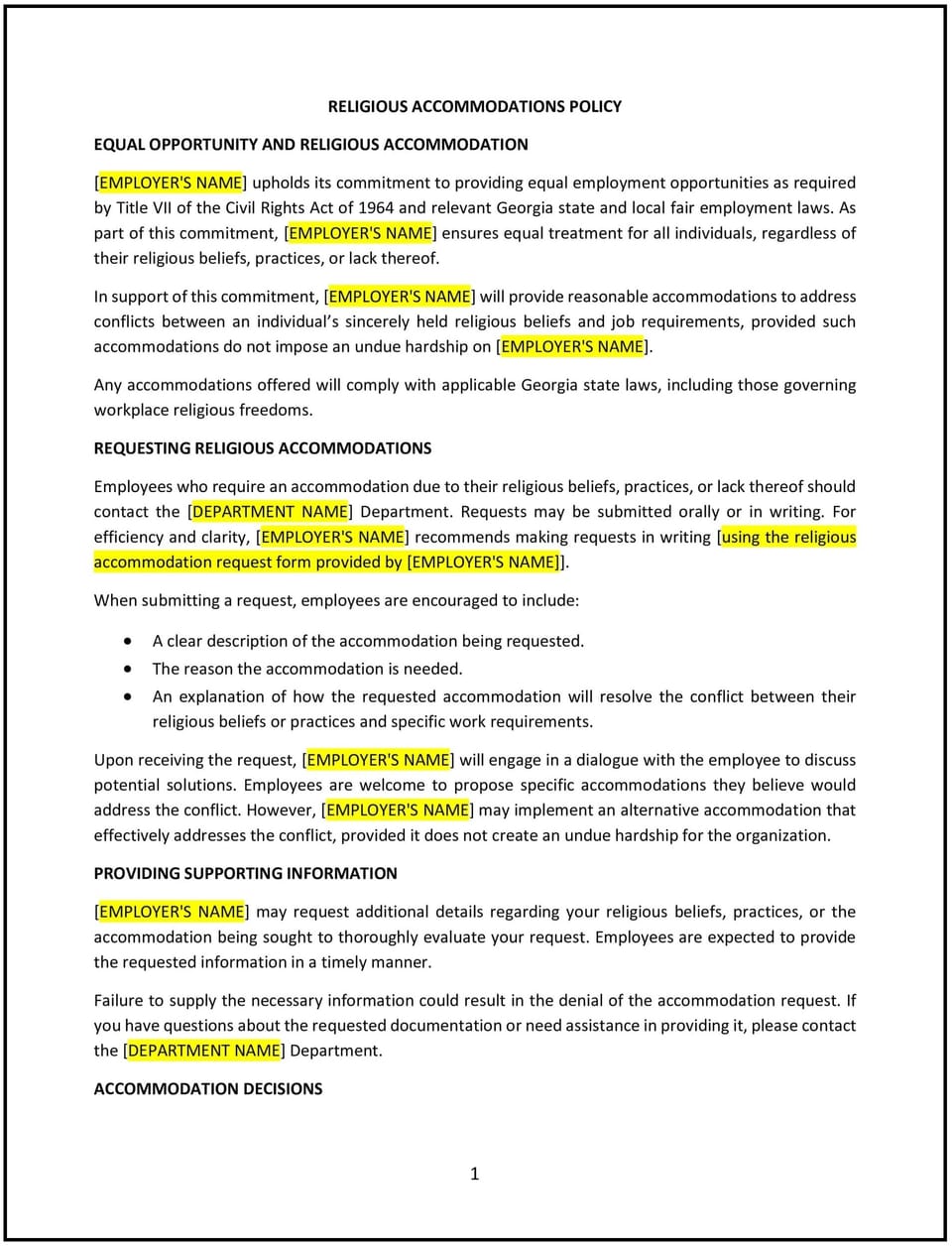Religious accommodations policy (Georgia): Free template

Religious accommodations policy (Georgia)
This religious accommodations policy is designed to help Georgia businesses create a supportive workplace by addressing the religious needs of employees. The policy outlines procedures for requesting accommodations, evaluating requests, and maintaining a respectful work environment.
By implementing this policy, businesses can promote inclusivity, respect diversity, and support employees in balancing their religious practices with their professional responsibilities.
How to use this religious accommodations policy (Georgia)
- Define religious accommodations: Specify what constitutes an accommodation, such as schedule adjustments, prayer breaks, or exemptions from certain dress codes.
- Establish a request process: Provide a clear procedure for employees to request accommodations, including submission of written requests and supporting documentation if needed.
- Evaluate requests: Require managers or HR to assess requests based on reasonableness, potential impact on business operations, and available alternatives.
- Encourage open communication: Foster a dialogue between employees and management to explore solutions that balance employee needs with business requirements.
- Address scheduling needs: Offer flexible work arrangements, such as shift swaps or adjusted hours, to accommodate religious observances.
- Maintain neutrality: Ensure decisions about accommodations are free from bias or discrimination and uphold workplace inclusivity.
- Protect confidentiality: Emphasize that details of accommodation requests will be handled discreetly and shared only on a need-to-know basis.
- Review and update regularly: Periodically assess the policy to reflect changes in Georgia workplace practices, employee feedback, or legal considerations.
Benefits of using this religious accommodations policy (Georgia)
Implementing this policy provides several advantages for Georgia businesses:
- Fosters inclusivity: Accommodating religious practices promotes a welcoming and supportive work environment.
- Enhances employee satisfaction: Employees feel valued and respected when their religious needs are acknowledged.
- Reduces conflicts: Clear guidelines minimize misunderstandings and disputes related to religious accommodations.
- Promotes flexibility: Addressing employee needs supports a positive workplace culture and operational adaptability.
- Reflects Georgia-specific needs: Tailoring the policy to local workforce dynamics and cultural diversity ensures its relevance and practicality.
Tips for using this religious accommodations policy (Georgia)
- Communicate policy clearly: Share the policy with employees during onboarding and through regular updates.
- Provide manager training: Equip supervisors with tools to handle accommodation requests sensitively and effectively.
- Encourage proactive requests: Let employees know they can approach HR or management early to discuss potential accommodations.
- Balance operational needs: Assess requests carefully to ensure they align with business requirements while addressing employee needs.
- Monitor and refine: Collect feedback on the policy’s effectiveness and update it to reflect workplace changes or employee concerns.
Q: What types of accommodations can businesses provide?
A: Businesses should consider adjustments such as flexible schedules, prayer breaks, exemptions from dress codes, or time off for religious observances.
Q: How should employees request religious accommodations?
A: Employees should submit written requests to HR or their supervisor, including details of the accommodation and supporting documentation if necessary.
Q: Are businesses required to accommodate all requests?
A: Businesses should evaluate requests for reasonableness and consider operational impact while striving to meet employee needs.
Q: Can businesses deny a religious accommodation request?
A: Businesses may deny a request if it creates an undue hardship, but should explore alternative solutions with the employee.
Q: How should businesses address scheduling conflicts related to religious observances?
A: Businesses should work with employees to find solutions, such as shift swaps, adjusted hours, or time off, that meet both operational and employee needs.
Q: How should businesses handle conflicts arising from religious accommodations?
A: Managers should address conflicts promptly, emphasizing mutual respect and adherence to the policy’s guidelines.
Q: How often should this policy be reviewed?
A: The policy should be reviewed annually or as needed to reflect changes in Georgia workplace practices or organizational goals.
This article contains general legal information and does not contain legal advice. Cobrief is not a law firm or a substitute for an attorney or law firm. The law is complex and changes often. For legal advice, please ask a lawyer.


